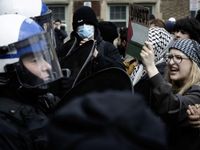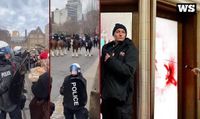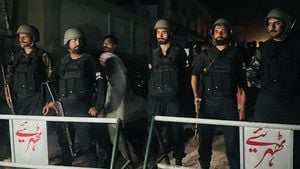McGill University in Montreal has become the epicenter of a heated three-day student strike, with protests erupting both inside and outside classrooms as students rally for Palestinian rights. Beginning Wednesday, April 2, 2025, the strike, organized by the Students’ Society of McGill University (SSMU), aims to pressure the university to divest from weapons manufacturers linked to Israel amidst its ongoing conflict in Gaza.
On the first day of protests, B’nai Brith Canada reported on social media that anti-Israel protesters were physically blocking access to lecture halls within the Bronfman building, disrupting classes and preventing fellow students from exercising their right to education. “Protest is a protected right — intimidation is not,” they stated on X, emphasizing that students should not have to choose between safety and education. “Disrupting classes, harassing students and faculty, and hijacking campus spaces is not activism; it’s dangerous behavior that has no place on a Canadian campus,” they added.
By Thursday, April 3, the protests had escalated. Pro-Palestinian demonstrators threw paint and shattered glass inside the McConnell Engineering Building, specifically targeting the dean’s office. This act of vandalism marked a significant intensification of the protests, which had already seen masked individuals blocking lecture hall entrances, leading to the cancellation or relocation of approximately 20 classes on the first day.
Montreal police were present to maintain order, arriving around 12:30 p.m. on Thursday as protesters gathered outside the student union building on McTavish Street. Police spokesperson Agent Manuel Coupre confirmed that officers were deployed to prevent clashes between pro-Palestinian and pro-Israel demonstrators. “We do know that some protesters gathered inside the building, but most of our police operation was conducted outside,” he said. Despite the tensions, no arrests were made during the protests.
McGill University, facing disruptions to its academic activities, stated that it was working with police to facilitate access to classrooms. In a statement, the university noted that more classes had to be canceled on Thursday due to the protests, which continued into the afternoon. The university also announced that starting Friday, April 4, access to its buildings would require a valid student or employee identification card.
The student-led strike was approved in a referendum with 72 percent of nearly 4,000 participants voting in favor, representing about 17 percent of the student body. However, the student union clarified that the rally on Thursday was not organized by its executive, indicating a division within the student body regarding the strike’s direction and tactics.
Throughout the protests, demonstrators waved Palestinian flags and chanted slogans, while some non-student supporters joined in. Videos circulated online showing the extent of the protests, with activists unfurling banners and spraying red paint on doors to symbolize bloodshed. Some students reported feeling intimidated, as activists encouraged their peers not to attend classes and to participate in alternative “lectures” on the Israeli-Palestinian conflict.
In response to the ongoing turmoil, McGill President Deep Saini had previously announced last June that the university would explore divestment from all arms manufacturers, irrespective of geopolitical considerations. This decision came in the wake of a prolonged standoff between the university and anti-Israel protesters last year, which had raised significant concerns about campus safety and academic integrity.
Angela Campbell, McGill’s associate provost, condemned a form that circulated among students titled “Report Your Non-Compliant Prof,” which requested class times, room numbers, and screenshots of professors’ messages regarding those who continued to teach during the strike. Campbell described the form as “totally unethical, unacceptable and damaging to our community,” characterizing it as an intimidation tactic that violates the university’s student code of conduct.
Meanwhile, the student group Solidarity for Palestinian Human Rights (SPHR) McGill, which has faced scrutiny and lost its official club status last year due to controversial social media posts, defended its right to peaceful protest. The group claimed that the protest was a necessary response to the university’s perceived inaction regarding its investments in companies that support the Israeli military.
As the strike continues, the situation remains tense, with advocacy groups such as Federation CJA and the Centre for Israel and Jewish Affairs (CIJA) expressing deep concerns over the escalation of protests. They noted that the disruptions confirmed fears that the situation could worsen, as tensions between the two groups have been palpable.
As the strike progresses, McGill University faces the challenge of balancing the right to protest with the need to maintain academic integrity and safety on campus. The administration's response, along with the actions of both protesting groups, will likely shape the university’s policies and student dynamics in the coming months.
While the protests have garnered significant attention, they have also sparked a debate within the McGill community about the limits of activism and the responsibilities of students to uphold a conducive learning environment. As the final day of the strike approaches, many are left wondering how the administration will address the calls for divestment and the broader implications of the ongoing conflict in Gaza on campus life.





